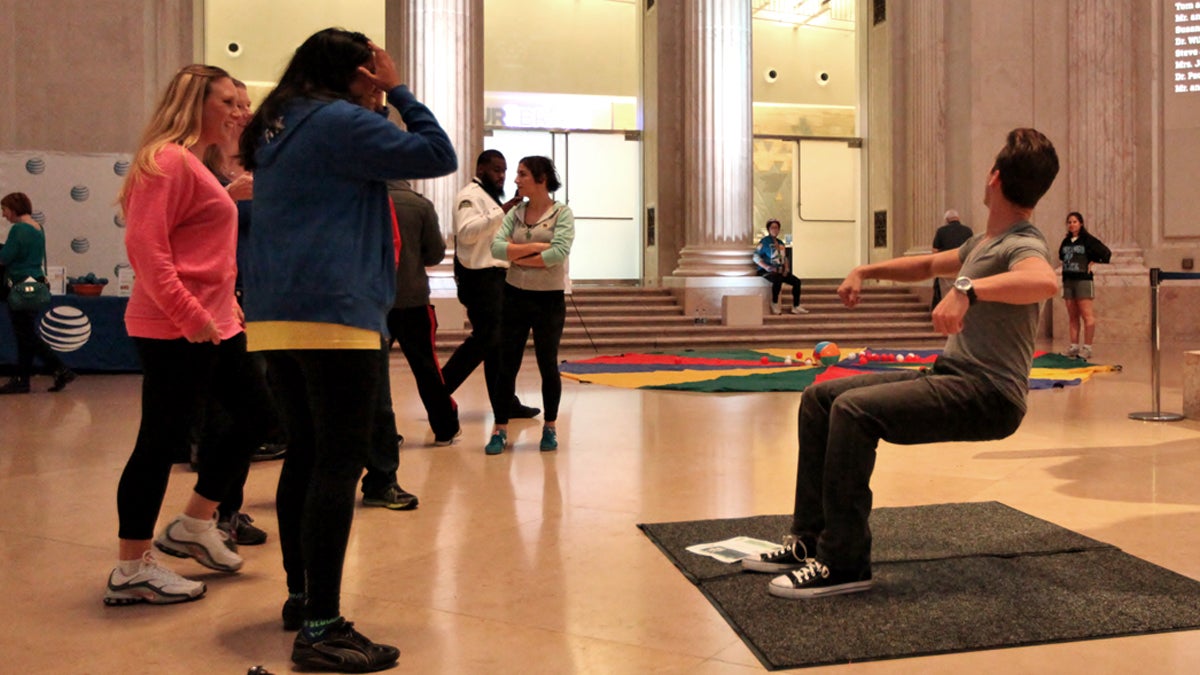Reading a person’s mind is ‘skill, not magic’
Listen
Max Major sits in an invisible chair at the Franklin Institute as people watch in disbelief. (Photo credit ©Darryl W. Moran Photography/The Franklin Institute)
Max Major looks more like a European soccer star than a magician, with his lean, athletic physique and stylish hairdo – somewhere between a faux-hawk and gel-back.
He wears a v-neck t-shirt, designer jeans, cool sneakers, and a necklace with a key around his neck.
“Did you have a pet as a kid?” he asked me. I thought of my long-departed parakeet, and answered yes.
Major asked me to think of my pet’s name, and to spell it in my head.
He asked me if the name started with a ‘G’, which it did.
“Was the name Goldy?” he asked? I have to admit, I was blown away. There’s no way Major could have Googled the name of this pet bird – I have never talked about him online, or in any of my stories. He wasn’t the most interesting pet, to be frank.
Not surprisingly, Major wouldn’t explain to me how he figured out the name, but he said that we all give off tiny clues as we spell things in our heads or think of a specific letter. I’m guessing I nodded my head slightly for each letter as I spelled the name in my head, and perhaps looked in a certain direction as I sounded out the name.
Max Major started doing magic tricks as a kid, but decided to broaden his repertoire as a teenager, when his dad quit smoking through hypnosis. “I thought ‘this is real magic’,” he recalled. The Washington, D.C. performer started studying that technique, as well as body language and reading people’s facial expressions. “There is no university for that,” he joked. Instead, he read old texts on body language, went to workshops, and sought out mentors.
He also spent countless hours watching people. “It’s a lot of fun when you first start doing this, to sit in a coffee shop and try to figure out how people’s first dates are going, or what they are talking about.”
His current show “Think Again” is a mixture of magic, mind-reading, hypnosis, and suggestion.
He says a lot of it is a matter of paying very close attention. “So often when we are in a conversation, we’re stuck in our own heads, we’re thinking about what we’re going to say next rather than paying attention to the person we’re talking to. So simply by looking for body language, you will already be a better communicator.”
Facial expressions give away a lot, but Major says we have all learned to control our faces pretty well to hide certain emotions, or feign others. It’s something we begin to learn as babies. So, he looks at the entire body, from the ground up. “If you watch somebody’s feet, they often reveal a lot more than their face, because we’re so used to presenting a face to others, so the direction their feet are pointed might reveal how interested they are in the conversation.”
Major says when somebody’s feet are pointed away from the conversation, perhaps toward the door, it’s a good indication they have lost interest.
WHYY is your source for fact-based, in-depth journalism and information. As a nonprofit organization, we rely on financial support from readers like you. Please give today.




